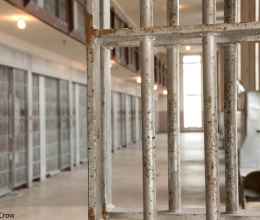Kentuckians overwhelmingly support a halt to executions until problems with the state’s capital punishment system are solved, and 57.8 percent believe that lengthy prison terms, including life without parole, are preferable to the death penalty as punishment for people convicted of first-degree murder.
These findings are from a recent poll by the University of Kentucky Survey Research Center that also gauged Kentuckians’ opinions on issues related to the cost of administering capital punishment, the possibility of executing an innocent person and other matters.
The poll, conducted between March 4 and April 30, 2016, included interviews with 684 Kentuckians over the age of 18. Its margin of error was plus or minus 3.8 percent.
The support for a death penalty moratorium came in response to the following question about an analysis of Kentucky’s death penalty laws, procedures and practices*:
A two-year study by a panel of Kentucky law professors, judges, and other legal scholars found major problems in the administration of the death penalty in Kentucky and recommended that the state should suspend executions until those problems were fixed. In light of these problems, would you support a decision by the governor to halt all executions until these problems can be addressed?
Nearly three-fourths of the respondents, 72.4 percent, told interviewers they would support the governor taking such an action. That exceeded the level of support for the death penalty reflected in the poll (69.3 percent). Even among those who support the death penalty, 62.6 percent said there should be a halt in executions until the system’s problems are addressed.
“It is important to note that this new poll shows that Kentuckians are increasingly concerned about the fairness of our criminal justice system,” said Marcia Milby Ridings, former president of the Kentucky Bar Association and a member of the American Bar Association assessment team that studied Kentucky’s death penalty.
“Right before the ABA released our assessment of Kentucky’s death penalty in 2011, approximately 62 percent of Kentuckians supported a temporary halt of executions so that the system can be more closely examined and problems identified. Now, more than five years after we completed that examination and offered specific reforms, even more Kentuckians want action on those reforms before our state imposes the ultimate punishment in their names.”
Support for the death penalty also declined when respondents were given a choice of punishments for people convicted of first-degree murder, posed in the following question:
Which of the following punishments do you personally think is most appropriate for persons convicted of first-degree murder in Kentucky?
Responses in support of the different punishments were:
- Death penalty – 42.2 percent
- Life in prison with no chance of parole – 35.4 percent
- Life in prison with no chance of parole for 25 years – 7.4 percent
- Life in prison with no chance of parole for 20 years – 2.1 percent
- A sentence of 20-50 years with a chance of parole after 85 percent of the sentence is served – 13 percent
A query about the high cost of administering the death penalty found 68 percent of the respondents strongly or somewhat support replacing it with life imprisonment without parole. The interviewers asked the following question:
If it were shown that because of the constitutionally mandated appeals and additional trials and housing costs associated with the death penalty that the death penalty costs taxpayers substantially more than sentencing prisoners to life in prison with no possibility of parole, would you support or oppose replacing the death penalty with a sentence of life in prison without the possibility of parole?
The possibility of executing an innocent defendant also concerns most Kentuckians. Overall, 71.6 percent strongly or somewhat agreed that the capital punishment system risks executing the innocent. Of those who support executions, 61.4 percent agreed that there are risks of executing the innocent. The opinions were expressed in response to the following statement:
In the U.S. at least 155 people have been wrongfully convicted and sentenced to die for crimes they did not commit. Some innocent people have even been executed. The death penalty carries too much risk of executing an innocent person.
“Although a majority of Kentuckians will say they support the death penalty in the abstract, when made aware of how costly it is to implement and that it risks the taking of innocent human life, they overwhelmingly reject it and choose life without parole as punishment for capital murder,” said the Rev. Patrick Delahanty, chair of the Kentucky Coalition to Abolish the Death Penalty.
“They have said this over and over again for decades in public opinion surveys. I've said for years the death penalty you support is not the one we are using. It is time to abolish that system.”
When considering the negative effect on victims’ families of the lengthy capital punishment process in Kentucky, nearly two-thirds of the survey respondents (64 percent) strongly or somewhat agreed that life without parole should replace the death penalty as a punishment. The respondents were asked whether they agreed with the following statement:
Death penalty cases can drag on for more than a decade, forcing victims’ families to endure years of uncertainty and waiting. In contrast, a sentence of life in prison without parole could offer swift and certain justice that allows victims to move on with the healing process as soon as the trial is over. Murderers need to be severely punished, but Kentucky’s death penalty system isn’t working and should be replaced with life in prison without the possibility of parole.
“Clearly, Kentuckians remain uncomfortable with death as a sentence. Their discomfort is well founded,” said Kentucky Public Advocate Ed Monahan. “Our system of administering capital punishment is broken, costly and produces little value. Full reform must take place now. Gradualism is not acceptable in this matter of life and death.”


